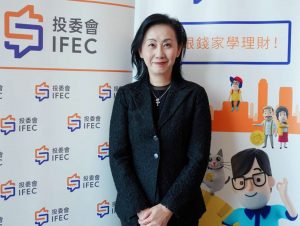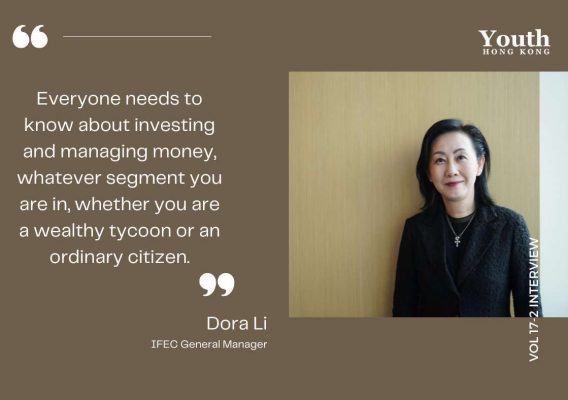Investor and Financial Education Council: Secure Our Financial Future
Secure Our Financial Future
— An interview with Dora Li, General Manager of the Investor and Financial Education Council (IFEC)
How IFEC strives to reach the unreachable and prepare youth for a financially resilient future.
Dora Li, General Manager of the Investor and Financial Education Council (IFEC), talks about the Council’s approach to bolstering financial literacy, especially among youth. From offering an innovative gamified learning hub to stressing the timeless virtue of critical thinking, she outlines the IFEC’s ways of equipping the public with the knowledge, attitudes and skills for navigating an increasingly complex financial environment in the digital age.
| The Investor and Financial Education Council (IFEC), previously the Investor and Financial Education Centre, was born out of a recognised need for a body dedicated to investor education following the amendment of the Securities and Futures Ordinance in 2012. As a subsidiary of the Securities and Futures Commission (SFC), the public organisation is dedicated to improving investor and financial education in Hong Kong. It represents Hong Kong internationally and shares best practices on investor and financial education to promote financial literacy. |
Financial Education for Everyone
According to Dora, Hong Kong is one of the world’s earliest financial hubs to have a financial literacy strategy. This strategy guides the work of the IFEC, which aims to serve the entire Hong Kong public while focusing on key groups including students from kindergarten to tertiary education, working adults, investors, the elderly and vulnerable groups.
Holding the belief that financial education is everyone’s business, IFEC collaborates with NGOs, government departments, regulators and the finance industry through various campaigns and programmes to raise public awareness. A highlight of its recent efforts was the opening of the IFEC FinEd Hub last year at The Mills in Tsuen Wan. Instead of only trying to “push” people in the right direction, the hub embodies a “pull” strategy by using games. As Dora explains, “I don’t think Hong Kong has done anything like this before. The games are fun because gamification can create immersive, engaging learning for all sectors of society, as outlined in our financial literacy strategy.”
Interestingly, the lively FinEd Hub was originally a cha chaan teng (a local-style cafe) that closed during the COVID-19 pandemic. Now transformed into a digital experiential learning centre, visitors play games that include a farming simulation that teaches money management and investment knowledge, or an adventure game designed to educate people about anti-financial scams.

The IFEC FinEd Hub is Hong Kong’s first digital experiential learning centre dedicated to investor and financial education.
Knowledge, Attitude and Behaviour
The IFEC has been monitoring Hong Kong’s financial literacy levels with a survey toolkit developed by the OECD International Network on Financial Education (OECD/INFE). Widely used internationally to benchmark financial literacy levels and guide policy development, the toolkit assesses adult financial literacy based on three core components: financial knowledge, financial attitude and financial behaviour, with a maximum combined score of 100 points.
What Dora sees, having observed Hong Kong’s financial literacy landscape for years, is a mixed picture. Hong Kong’s overall financial literacy level has been on the rise since 2019. While the city ranked top in the OECD/INFE study on financial literacy in 2020 across 26 jurisdictions overall, it scored 31.8 out of 35 (90%) in financial knowledge in 2024. When it comes to younger generations, Dora highlights the fact that Hong Kong youth, specifically those aged 18 to 29, to no one’s surprise, possess strong financial knowledge when compared to their peers in other countries and regions. She attributes this in part to Hong Kong being an efficient city and a highly sophisticated international financial centre, factors that perhaps inevitably shape young people’s financial sense.
Juxtaposed with this high level of financial knowledge, however, are the financial attitudes, where Hong Kong has room for improvement. As Dora explains, the difference is that attitude encompasses long-term planning and goal-setting. With the city scoring around 10.7 out of 20 (54%), Dora can see how attitudes have been influenced, more recently, by socio-economic factors, including the pandemic, leading to a degree of economic instability.
Attitude becomes manifest in behaviour and Hong Kong scored 28.6 out of 45 (64%), representing a slight increase from 27.5 points reported in 2022. Despite the relatively high scores, Dora points out some prevalent and sometimes worrying trends. “About half of the surveyed students prioritise instant gratification over disciplined money saving,” a tendency, Dora notes, that isn’t unique to Hong Kong. For young investors, according to the IFEC’s Retail Investor Study 2023, she notes that around 70% of them aim for quick returns through short-term trading. This also still leaves room for improvement in long-term planning and goal-setting. With a touch of candour, she admits, “I used to be like them.”

IFEC launched the “Lost and Found II” online financial management campaign in 2024 to strengthen financial knowledge among the young generation.
These figures, derived from the IFEC’s Financial Literacy Monitor, serve as important pointers for the Council’s work on identifying and addressing the gaps. “We are doing quite well from the results that we’ve seen for the past few years. But we are still not happy about many things. Yet to stay positive, I would say we are progressing,” Dora says. “And that at least means we are not complacent.”
But what’s the solution to young people’s, in particular, reckless short-term spending and investing habits? The answer is simple: track daily expenses and income. She shares an example of how a colleague of hers successfully curbed excessive spending and living life from paycheck to paycheck, by using the Money Tracker app developed by IFEC. “This helps you take the first step on a financial management journey,” Dora says, recommending that parents and young people, of all ages, take “baby steps” in order to make more informed financial decisions, even small ones.
Investing Realities
With regards to investing, Dora emphasises the importance of conducting research, along with thinking and understanding the implications and risks associated with each decision. She particularly warns against the widespread “availability bias” in finance, where one believes in information that comes easily to mind when making judgments or decisions. This cognitive shortcut and overconfidence tend to affect people in making investment and financial decisions. Often, investors purchase investment products without fully understanding the associated risks or potential vulnerabilities to scams.
Dora recounts conducting an intriguing experiment during an OECD/INFE meeting in Mexico. She introduced her audience to Mexico’s special soft drink formula made with white sugar, which she deliberately touted as being both refreshing and healthier. Several hands shot up, eager to taste it. “People make choices without thinking it through or doing any research,” she explains. “If they had checked online, they would have known I was lying.” With a grin, she admits that she deliberately misled the audience, to show how human brains work and how decisions can be made on assumptions. This offers a particularly stark warning to people who might become victims of investment scams.
She contrasts this with a story from her banking career years ago, when a woman visited her branch in Kowloon three times, meticulously researching fixed deposit options before committing her savings. “In the past, people were very prudent with money,” she says.
Today, digitalisation has simplified investment and financial decisions to a single tap—yet digital advancements present challenges and risks. In an era of AI, Deepseek, and tools like ChatGPT, misrepresentations and disinformation can easily be presented in a seemingly confident way. “Critical thinking ability is most important. Young people, too, need to be discriminating and question, double-check, and understand themselves before they invest.”
“Whatever segment you are in, whether you are a wealthy tycoon or an ordinary citizen,” Dora says, “everyone needs to know about investing and managing money.”

Dora Li, General Manager of the Investor and Financial Education Council (IFEC), speaks with Youth Hong Kong in May 2025.
Be Future Ready
Ultimately, in the context of digitalisation, the goal of IFEC is to build a social network that helps young people navigate online information, but at the end of the day, they are the ones who have to make decisions. “The financial literacy gap has to be filled by themselves. I don’t think IFEC can do a lot for them, but we can help them to help themselves in many ways,” she says. “Parents, schools, teachers, friends, and peer influence are also important if we want Hong Kong young people to have a better future.”
Dora advises young people to “take one step back” to have a critical mind about everything that they see. She suggests a shift in perspective: “In the past, one was presumed innocent until proven guilty,” adding that young people now should be more cautious and “presume guilty until proven innocent when they look at other things.”
Looking ahead, Dora says IFEC will continue its mission to “reach the unreachable,” a strategy that she says is showing results. “The gap is slowly filling up, although not very quickly.” While gamification is already a well-established tool in IFEC’s arsenal, the organisation is thinking of AI and new initiatives for the future.
A key strategy, according to Dora, is for IFEC to “be ultra nimble when looking at the financial situation across the world, not just in Hong Kong. We need to be faster and inform people so that they can be well-prepared.” Despite the challenges, she is optimistic about the future for Hong Kong’s youth, citing the vast opportunities in money management and investment in the city. ■


